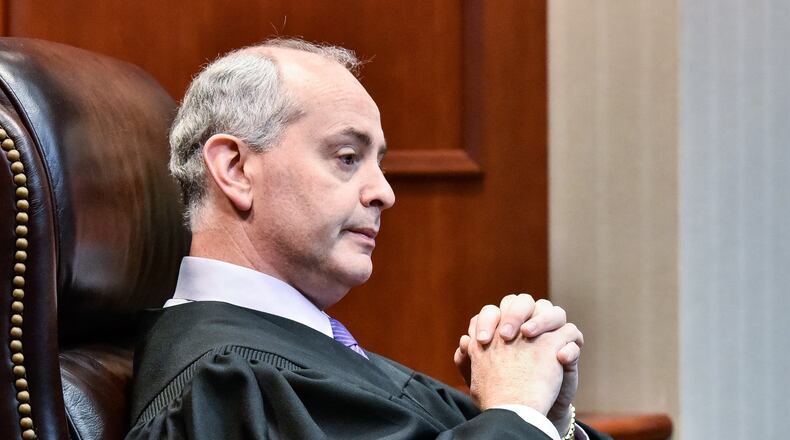Stephens’ attorney Linda Woeber told the Journal-News the jury awarded $835,000 in back pay, $250,000 in compensatory damages and $35,000 in punitive damages.
“We strongly believe that the evidence didn’t support the verdict and we’re considering options,” Woeber said.
Edelstein couldn’t be reached for comment.
According to docket entries, closing arguments were Thursday, and the jury got the case. Edelstein and Stephens both testified — Edelstein was representing herself — as had a rabbi, a doctor, her former employer Wood County Prosecutor Paul Dobson, Judge Keith Spaeth, some other former and current court employees and attorneys who routinely practice in the court.
Edelstein filed a $1 million lawsuit against Stephens, Butler County Prosecutor Mike Gmoser and Chief Assistant Prosecutor Dan Ferguson in 2017, claiming Stephens fired her for wanting to take off eight Jewish high holy days and saying the men bad-mouthed her, destroying her career.
Edelstein worked for Stephens after Judge Patricia Oney retired in early 2016. Edelstein told Stephens on July 28, 2016, she would need to take eight days off in October to observe Jewish high holy days.
She said Stephens reacted to her request by yelling, “Holy cow, eight days,” and he appeared to be angry, according to court filings. She was fired four days later.
Stephens says he “terminated Edelstein after months of internal strife between Edelstein and other members of his personal staff, which created a negative and disruptive work environment,” according to court records. In addition, Woeber noted early on Stephens did not fire her because of her religious practices and in fact the magistrate that replaced her was Jewish.
Edelstein said based on depositions taken in the case, Stephens “fabricated” the problems after she accused him of discrimination.
“During the four and a half months that plaintiff worked for Stephens, Stephens never mentioned issues with plaintiff to the court administrator or to the presiding judge,” she wrote in one document. “Furthermore staff at the court attested that she had never witnessed plaintiff acting abusively.”
U.S. Magistrate Judge Karen Litkovitz issued a 75-page recommendation more than three years ago, finding the claims against Gmoser and Ferguson should be dismissed and determining a jury should hear discrimination accusations against the judge.
She said the close time between the vacation request and the termination was suspect, which means a jury should decide the question. She said Edelstein produced evidence “which would allow a reasonable jury” to find Stephens’ decision “at least in part” was motivated by her request observe Jewish holidays. U.S. District Court Judge Michael Barrett agreed.
Edelstein also claimed Stephens “stigmatized” her with the abrupt firing and made disparaging remarks about her within the legal community, destroying her ability to find another job. On that question, Litkovitz found in favor of Stephens, saying much of Edelstein’s evidence was unsubstantiated hearsay.
Edelstein has represented herself throughout most of the protracted proceedings but attorney Paul Croushore filed an appearance to represent her on Dec. 5. He filed another motion Jan. 13 asking the judge to release him because “the client does not cooperate with counsel.”
In her complaint she asked for compensatory damages for humiliation, pain and suffering and emotional distress ($300,000); lost income, back and front pay and benefits ($300,000); liquidated damages ($300,000) and other monetary awards including punitive damages.
In the proposed jury instructions filed in the docket the defense objected to allowing the jury to consider punitive damages and there is no mention of liquidated damages, which are just unspecified monetary awards.
The overarching proposed jury instruction on damages reads:
“In determining the amount of any damages you decide to award, you should be guided by dispassionate common sense. You must use sound judgment in fixing an award of damages, drawing reasonable inferences from the facts in evidence,” the instruction reads. “You may not award damages based upon sympathy, speculation, or guesswork. On the other hand, the law does not require that Ms. Edelstein prove the amount of her losses with mathematical precision, but only with as much definiteness and accuracy as circumstances permit.”
Lawsuits like these are not cheap. The county’s insurance deductible with the County Risk Sharing Authority (CORSA) is $100,000 and the county has paid that already in this lawsuit. County Administrator Judi Boyko said CORSA has advised her money they have paid for legal fees beyond the deductible are not public records, but “the County has paid in attorney fees over its $100,000 deductible and less than its $500,000 aggregate deductible.”
About the Author

